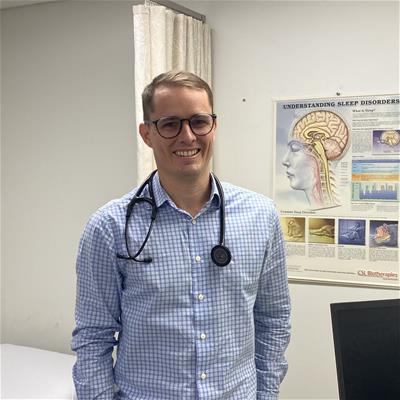
Newborns often find it easy, teenagers might be convinced they don’t need it and adults commonly want more. But no matter your age, getting a good night’s sleep is an essential function which helps keep us happy and healthy.
To mark World Sleep Day on Friday 18 March 2022, we sat down with St Andrew’s Respiratory and Sleep physician, Dr Tom Skinner, to find out about good quality sleep and how we can improve our hours of shut-eye.
“Sleep is crucial to our health. By the time you are 60 years old, you will have spent around 20 years of your life asleep,” Dr Skinner said.
“Despite common beliefs, it is not simply a passive state of turning off. There is significant brain activity in sleep with important roles in processing memories and recharging the body and mind.
“In the short term, missing even one night of sleep has been shown to impair driving ability more than being over the legal alcohol limit,” he said.
Fast Five with Dr Skinner
What makes a sleep good quality?
Good sleep requires adequate quantity and quality. Most adults should sleep for between seven to nine hours a night. People who have inadequate sleep over long periods have an increased risk of many diseases including hypertension (high blood pressure), heart attack and stroke, obesity, diabetes, depression and anxiety, memory loss, weakened immune system, lower fertility rates and psychiatric disorders.
Good sleep quality relies on the body moving through several distinct sleep phases, including light sleep, deep sleep (slow wave sleep) and dream sleep (REM sleep). If the sleep is disrupted, these sleep phases will be fragmented, also leading to unrefreshing sleep and poor health outcomes. A sleep study will tell us about a patient’s sleep quality.
How can we improve our sleep?
In most instances this is individualised and of course depends on identifying what problem is occurring with someone’s sleep. In general, my advice would be:
- Try to have a relaxing pre-bedtime routine, and try not to take your worries to bed with you.Writing them down to address the next day can be helpful.
- Have a regular sleep pattern where possible and pay attention to avoid changes on weekends (‘social jetlag’).
- Avoid electronic devices in bed.
- Avoid daytime naps, which can lead to poor sleep quality overnight.
For more detailed advice I would suggest reading the detailed fact sheets available at sleephealthfoundation.org.au.
What are some common sleep myths?
I hear at least one of these a week, and there are many misconceptions. Some common sleep myths include:
- You can train yourself to need less sleep. Whilst some people do require less sleep than others, you cannot teach your body to get used to less sleep. Attempting so will result in a reduction in cognitive performance and other possible complications.
- You can ‘bank’ sleep in advance.
- Regular snoring is normal. Snoring, especially when loud or accompanied by pauses in breathing, is a symptom suggestive of sleep apnoea and should not simply be dismissed as a bothersome bad habit until properly assessed by a medical professional.
- If you can’t sleep, its best to stay in bed until you fall asleep. It may seem counterintuitive, but if you are not able to fall asleep within 20 minutes you should in fact, leave bed and go do something relaxing and quiet in a dim environment until you feel ready for sleep. Lying in bed awake for prolonged periods leads to your brain associating the bed with frustration, rather than sleep.
What are the most common sleep disorders or conditions you diagnose, and are they treatable?
There are a wide variety of sleep disorders which I review and treat in clinical practice. The two most common sleep disorders I see are obstructive sleep apnoea and insomnia. Both of these conditions are completely treatable, which can vastly improve a patient’s quality of life.
What are the symptoms of poor sleep and when should people see a doctor?
There are multiple symptoms which could drive someone to seek assistance with their sleep, and I would encourage people to discuss any concerns they have with their GP. In general, regular loud snoring, awakening with significant headaches, excessive daytime tiredness, persistent trouble with initiating or maintaining sleep are all common symptoms that should be reviewed. Even without significant symptoms, people with medical conditions such as atrial fibrillation and high blood pressure should also have sleep disorders considered given the close links that exist.
Dr Tom Skinner is a respiratory and sleep physician at St Andrew’s War Memorial Hospital. Tom is a well-rounded practitioner with a broad range of skills across all aspects of respiratory and sleep medicine.